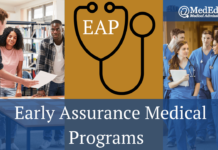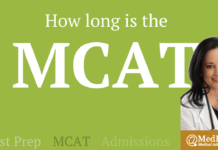Medical School Rankings: Do They Really Matter? (2022-2023)
Getting into a medical school — practically any medical school — is an achievement. But would-be medical students also want to know: Is this the best school for me? Many medical school applicants and parents are concerned about medical school prestige based on US News and World Report rankings but does this really matter when earning a medical degree?
Institutions and students alike have long used medical school rankings to evaluate the quality of the education and preparation for their future careers they will receive. But, so frequently, these rankings serve as a tool only to indicate prestige and do not reflect the actual training you can receive as a medical student nor how well prepared you may be for residency.
But when it comes down to it, how important are these rankings, really? Will they affect your chances of practicing medicine? What actually goes into lists like U.S. News’ annual rankings? At the end of the day, do they matter?
How are rankings calculated?
Before we assess whether rankings are important, it’s important to understand how medical schools are ranked in the first place. U.S. News is one of the most popular ranking systems, and they detail their 2022 methodology accordingly:
- Quality assessment: 30%
Peer assessment score: 15%
Residency director assessment score: 15%
- Research activity: 40%
Total NIH research activity: 25%
Average NIH research activity per faculty member: 15%
- Student selectivity: 20%
Median MCAT total score: 13%
Median undergraduate GPA: 6%
Acceptance rate: 1%
- Faculty resources: 10%
Does Research and NIH Funding Matter?
So, what do you notice in the ranking percentages above? Research activity is the most influential factor in rankings and NIH funding is the most important factor of all. Ironically, this says, literally, nothing about the actual education you will receive in medical school nor about the clinical or patient experience you will have in medical school. In a practical sense, NIH funding does not impact a medical students’ education or experiences.
In fact, some would argue that you will receive a better clinical education at a medical school where faculty are not focused on or distracted by research.
Bear in mind that there are a number of “unranked” medical schools. This means U.S. News doesn’t have enough data to rank the institution. There are also lower-ranked schools, those in the bottom 25% of the list, that are ranked in ranges as opposed to a single unit. Multiple schools sit within the same range. It is likely because these schools do not have much, if any, NIH funded research.
Different ranking systems prioritize different aspects of medical education, such as research — this is just one example.
Does Medical School Prestige Impact Residency Results?
NRMP data
The National Resident Matching Program (NRMP) offers data on how medical program directors evaluate residency candidates. According to the 2018 survey, overall, 50% of respondents cited “graduate of a highly-regarded U.S. medical school” as an important factor in selecting applicants to interview, making it relatively low in the rankings of factors contributing to this decision.
Bear in mind, however, that this varies considerably according to specialty. For example, 79% of directors of child neurology programs cited this as an important factor in selecting candidates to interview, while only 33% of dermatology program directors said the same. That means that it’s important to review the data for specialties that interest you.
However, what is important to understand is that with the USMLE Step 1 becoming a pass/fail test, medical school prestige could become a bigger factor in residency selection in the near future. This is something we will be watching closely at MedEdits.
Individual level
There is, of course, your own perspective to consider. When reviewing the rankings of your preferred list, think about how much the criteria for evaluation matter to you personally.
Remember, too, that where you attend medical school has bearing on where you complete your residency. You’re likely to receive a firm grounding on the important principles needed to practice medicine practically anywhere, since being admitted to medical school is a rigorous, challenging process in its own right. And, you’ll probably be placed in a residency — although it may not be your first choice.
Certainly, the quality of your residency and your experience within it will have an affect on your overall career, including your salary. But there are many other factors that go into being an excellent physician. Later into your career, the medical school that you attended is unlikely to be hugely influential.
That said, the quality of your training does matter. But how you assess what quality really is to you as a student will differ. If you attend Harvard or Johns Hopkins, that will certainly open doors for you. But if you excel in a lower-ranked program, you’re likely to see success, too.
Putting it all Together
What does this mean for you as a prospective medical student? In some context, yes, medical school rankings do matter. But it’s important to contextualize them and understand what, exactly, is being ranked. You should also consider your priorities, including the speciality you hope to pursue. In some cases, the caliber of the medical school you attend will have more bearing on your residency placement. Many medical students will tell you that better clinical training exists at schools without high research rankings. Why? These medical schools tend to have more clinician educators who have more time to devote to patient care and medical student education; they are not pressured to “produce” research results and apply for grants like their NIH funded colleagues.
So, while it’s not a bad idea to consider rankings, don’t let them be the be all and end all of your decision. There are plenty of excellent medical schools across the country, and wherever you go, you will almost certainly receive superior training to help you be a great physician.








